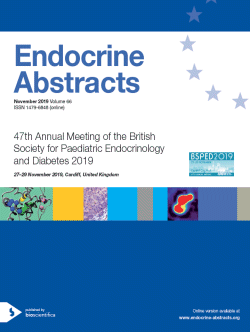
47th Meeting of the British Society for Paediatric Endocrinology and Diabetes
Cardiff,
UK
27 Nov 2019 - 29 Nov 2019

ORAL COMMUNICATIONS
Oral Communications 8
ea0066oc8.1 | Oral Communications 8 | BSPED2019
Random cortisols – as useful as a chocolate teapot (but less tasty)?
Colyer Sharon , Elder Charlotte
ea0066oc8.2 | Oral Communications 8 | BSPED2019
Adrenal Insufficiency: hydrocortisone prescribing and sick day rules
Webb Cameron , Stirling Heather , Kerr Stephanie , Davies Justin , Batchelor Hannah , Webb Emma
ea0066oc8.3 | Oral Communications 8 | BSPED2019
Specially identified patients (SIPs) – how do they work?
Rajyaguru Vipul , Tan Shin , Law James , Sachdev Pooja , Denvir Louise , Randell Tabitha
ea0066oc8.4 | Oral Communications 8 | BSPED2019
Optimising transition care in endocrinology: an example of patient-focused quality improvement
Makaya Taffy , Pal Aparna , Anderson Gemma , Loo Helen , Ashraf Muhammad Masood
ea0066oc8.5 | Oral Communications 8 | BSPED2019
The impact of Prader–Willi syndrome multidisciplinary clinic on growth parameters
Hu Kun , Krone Ruth , Follows Rebecca , Marks David , Barrett Timothy



